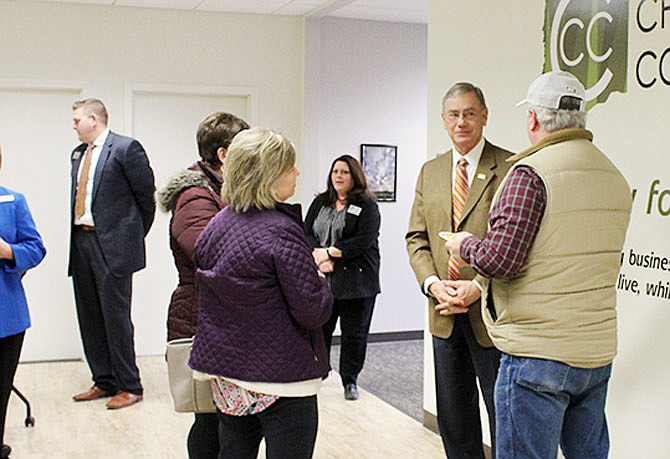U.S. Rep. Blaine Luetkemeyer spoke with local business people Wednesday about workforce development at a Callaway Chamber of Commerce business breakfast.
In his remarks to attendees, Luetkemeyer focused on the economy, frequently claiming there are 1.2 million more jobs in the country than people to fill them.
This figure sparked several audience questions from people curious as to how the disparity between jobs and unemployed people relates to skills and training.
"The problem with a lot of those folks, especially the ones who are unemployed and not getting a check, their skills have deteriorated or they have skills that don't translate in today's world," Luetkemeyer said.
Luetkemeyer noted the importance of workforce development programs and technical training as a solution.
"Every time I go out and talk to educators as well as business folks, I say, 'Look, you guys have got to be talking to each other,'" he said. "You've got to be talking to your local manufacturers, and your local all of the business folks here, 'So, what skill sets do you need for us to teach and work with to be able to have these kids walk out of school and be able to be employed?'"
For April Redman, the administrator at Callaway Senior Center, this raised more questions - what about people already in the workforce?
"What I see more often than not are folks who are kind of pushed out of the workforce because they already have student loan debt because they learned a trade that they needed to have at the time," Redman said. "But now, say, your coal-fired power plant workers, they're very well-educated. A lot of them are really hard workers. They've been doing this for maybe 20 years, but they're not ready to retire because they're not at that age yet, but now they can't seem to find their way into that green energy field because they've been working on this other side for so long. So how do they go about getting those educational funds?"
Redman explained the consequences of not being able to find a new job later in life can be devastating when retirement comes around.
"And when it comes to the retirement age, that puts them in a space where they need a whole lot of financial help, they're not being able to support themselves," she said. "I run the senior center - we have a large population even here, right here in Callaway County, of folks who do not have enough money to quite literally feed themselves on a daily basis."
Redman asked Luetkemeyer what he would say to someone in their 40s whose struggling to get back into the workforce.
In response, Luetkemeyer said that in his experience, businesses are frequently looking for experienced workers.
"With 1.2 million jobs out there, I would hope that there'd be something out there that these folks could find," Luetkemeyer said.
Luetkemeyer seemed to resonate most with the audience when the conversation moved to the subject of infrastructure.
"Is there anything that you know that is in the works, state or federal level, or what can we do at a local and state level to try and bring more attention and get that fixed?" Christopher Scott, of Farmers Insurance, asked.
Luetkemeyer suggested working with the state Chamber of Commerce to push the issue.
"Nobody wants to agree to, you know, pay more taxes, but I travel I-70 all the time," Luetkemeyer said. "How many people have to die on the roads before people get the message this has got to change? How many times do you have to fix your vehicle for something to change?"
Fulton Public Schools Superintendent Jacque Cowherd asked that Luetkemeyer support and work on the issue of mental health.
"You've done a lot of work in the mental health issue," Cowherd said. "From a school perspective, anything you can do to support community mental health - it doesn't have to be money in schools - because our struggle right now is we've got three social workers that we put on staff and we probably need three more just to deal with the mental health issues with the kids and the families."
Luetkemeyer agreed mental health is important, noting it could be part of the solution to mass shootings.
"It is an issue that we're well aware of," Luetkemeyer said.
Luetkemeyer also encouraged attendees to take the upcoming 2020 U.S. Census seriously, noting the population count impacts representation and the distribution of funds.

